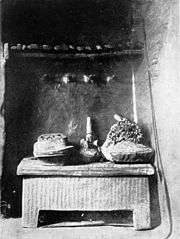Ogbanje
An Ogbanje (strictly "Ogbanje" and cannot be substituted with "Obanje", the "gb" forms a single consonant in Igbo language) is a term in Odinani for what was believed to be an evil spirit that would deliberately plague a family with misfortune. Its literal translation in the Igbo language is "children who come and go". It was believed that within a certain amount of time from birth (usually not past puberty), the Ogbanje would deliberately die and then come back and repeat the cycle causing the family grief. Female circumcision was sometimes thought to get rid of the evil spirit,[1] whereas finding the evil spirits Iyi-uwa, which they had dug somewhere secret, would ensure the Ogbanje would never plague the family with misfortune again. The Iyi-uwa was the Obanje's way of coming back to the world and also a way of finding its targeted family.
The dead child would be cut or mutilated so he or she would not return. Some ogbanje, however, were said to return, bearing the physical scars of the mutilation.[2] Belief in Ogbanje in Igboland is not as strong as it was before although there are still some believers. Sometimes the word Ogbanje has been used as a synonym for a rude or stubborn child. Sickle cell anaemia might have contributed to this belief, as the inheritance of the disease within families may have led people to conclude that the children involved were all from the same malevolent spirit.[3][4]
Ogbanje has been popularized by the critically acclaimed book by Chinua Achebe, Things Fall Apart with the character Ezinma who was considered an Ogbanje because she was the first of 10 children born to her mother that did not die in infancy.[5][6]
The word ogbanje is often translated as changeling, due to the similarities they share with the fairy changelings of Celtic and broader European mythology. Both serve as mythological ways of understanding what were once unknown diseases that often claimed the lives of children (such as SIDS and sickle cell disease).
See also
References
- ↑ http://www.fgmnetwork.org/gonews.php?subaction=showfull&id=1170937325
- ↑ Chinua Achebe Things Fall Apart
- ↑ Onwubalili JK (August 1983). "Sickle-cell anaemia: an explanation for the ancient myth of reincarnation in Nigeria". Lancet. 2 (8348): 503–5. doi:10.1016/s0140-6736(83)90524-x. PMID 6136656.
- ↑ Nzewi E (May 2001). "Malevolent ogbanje: recurrent reincarnation or sickle cell disease?". Soc Sci Med. 52 (9): 1403–16. doi:10.1016/S0277-9536(00)00245-8. PMID 11286364.
- ↑ Chinua Achebe Things Fall Apart
- ↑ http://education.yahoo.com/homework_help/cliffsnotes/things_fall_apart/32.html

